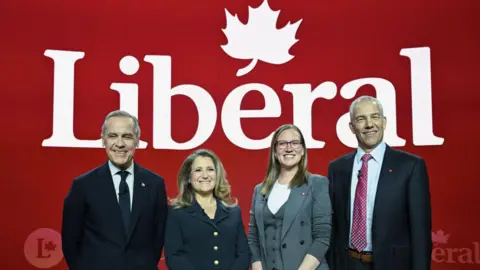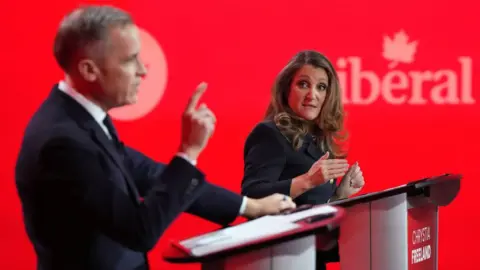BBC News, Toronto
 Getty Images
Getty ImagesCandidates vying to replace Prime Minister Justin Trudeau as leader of the Liberal Party of Canada faced each other for the first time on Monday in a French-language debate.
The stage was shared by four hopefuls: former governor of the banks of Canada and England Mark Carney, former Finance Minister Chrystia Freeland, Liberal government House leader Karina Gould, and businessman and former MP Frank Baylis.
The question of how to deal with Donald Trump dominated the first half, as the US president has repeatedly threatened to tariff Canada and make it the “51st state.”
Candidates also answered questions about domestic matters like immigration, healthcare and the high cost of living.
Early in the debate, Freeland – whose resignation as finance minister in December triggered the collapse of Trudeau’s leadership – stated that Trump represented “the greatest threat to Canada since World War Two”.
She frequently drew on her experience in government, saying that she had successfully faced Trump during his first term when she helped renegotiate North America’s longstanding free-trade agreement.
But Freeland warned that Trump’s second term might be worse for Canada.
“He wants to turn Canada into the 51st state, and it’s no joke,” she said. “That is why he is supporting [Russian President] Vladimir Putin’s criminal attempt to redraw Ukraine’s borders.”
“Trump wants to redraw our borders too,” Freeland said.
To counter these threats, Freeland and the other candidates suggested strengthening trade ties with the EU and the UK.
Baylis proposed a “new economic bloc” consisting of Canada, the UK, New Zealand and Australia, noting that all four countries shared the same values, cultures and governing systems.
Carney, who is frontrunner in the polls, focused his message on helping Canada achieve economic prosperity. He proposed doing so by leveraging its resources, including critical minerals and metals, as well as making Canada a “superpower of clean energy” and removing trade barriers between provinces.
He, too, agreed with Freeland that Trump’s second term was different from the first.
“He is more isolationist. He is more aggressive,” Carney said. “In the past he wanted our markets. Now he wants our country.”
He added that he would be in favour of imposing dollar-for-dollar tariffs on the US should Trump move ahead with his threat to levy a 25% tax on all Canadian goods starting on 4 March.
 Getty Images
Getty ImagesGould, the youngest candidate on the stage, positioned herself as the candidate “for today and the future”, with a message that homed in on how a Liberal Party under her leadership would work to make life more affordable for Canadians.
The candidates also addressed shifting US policy on Ukraine. As the four debated, Trudeau was in Kyiv marking three years since the Russia-Ukraine war began.
All four candidates agreed that Canada should continue supporting Ukraine. Freeland suggested that money seized from Russia through sanctions be redistributed to help Ukraine’s war effort, while Carney stated that any discussion on Ukraine’s future could not happen without the Ukrainians at the table.
Freeland also suggested that Canada should foster closer ties with Denmark which, she noted. was also facing threats from Trump who has signalled his desire to take over Greenland – a Danish territory.
For the second half of the debate, candidates offered up their ideas for how to help Canada reduce its federal budget deficit, tackle crime and increase its military spending.
They were also asked about climate change, with both Freeland and Carney saying they no longer supported a carbon tax on consumers – a key climate policy of the Trudeau government that has become unpopular with Canadians.
At certain points, candidates also took aim at Conservative Party leader Pierre Poilievre, saying he would be unfit to defend Canada against Trump.
Poilievre is currently leading in the national polls, though the gap between him and the Liberal Party has narrowed since Trudeau’s resignation. The Conservative leader has since focused his attacks on Carney, arguing that a Liberal Party under his leadership would not be different from that under Trudeau.
Monday’s debate is the first of two, with a second, English-language debate slated for Tuesday. Liberal Party members will vote for their next leader on 9 March, after which Trudeau is expected to step down.
The French-language debate is especially important for Francophone Canadians in Quebec, whose votes are influential in helping decide which party will form Canada’s next government.
Whoever is elected as leader would become Canada’s next prime minister until the next general election, which must be held on or before 20 October.
